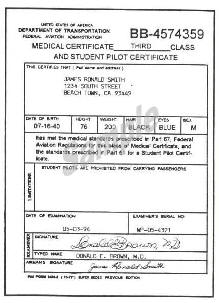|
|||||||||||||||||
|
|
|
|||
|
Pilot With HIV Sues FAA Under Privacy Act Of 1974 By |
||||
 |
February 9, 2010 -
Stanmore Cooper learned he was HIV/AIDS positive and at the time he was
an active FAA licensed pilot. Prior to testing and unaware he had
acquired the virus, Cooper began to succumb to opportunistic infections,
he developed Peripheral Neuropathy. A condition caused by nerve damage
which is an area that carries information to and from the brain and
spinal cord. In many cases, Peripheral Neuropathy symptoms improve with
time, especially if it's caused by an underlying condition that can be
treated.
Human
immunodeficiency virus (HIV) is a lentivirus (a member of the retrovirus
family) that causes acquired immunodeficiency syndrome (AIDS), a
condition in humans in which the immune system begins to fail, leading
to life threatening opportunistic infections if untreated.
Cooper began to
experience those conditions associated with Peripheral Neuropathy, such
as loss of sensation, pain and an inability to control muscles. Cooper
under went an extensive medical exam, he learned that he was HIV/AIDS
positive and that he was suffering from Peripheral Neuropathy. Cooper
was place on HIV medication.
|
|||
|
Cooper?s medical
condition began to deteriorate, typically it takes a while before the
benefits of the medication begins to shows positive results. Cooper
sought medical and financial relief. He applied to the Social Security
Administration and began receiving disability benefits.
Cooper continued
with his regiment of HVI medications and over the years, Cooper's
T-Cells increased dramatically and he found himself able to go back to
work. Cooper notified the Social Security Administration he was no
longer in need of benefits and was going back to work.
In 1998, itching
to fly again as a private pilot Cooper applied for a new third class
airman?s medical certificate, he competed the required forms and passed
the physical and again applied in 2000, 2002, and 2004, and again passed
the physicals. However, Cooper failed to report on the medical forms for
all four years that he was on HIV medication and of his HIV status,
although he did report he was on Lipitor.
|
||||
|
Cooper was in
violation of section 67.403 (A) (1). Which reads, ? 67.403 Applications,
certificates, logbooks, reports, and records: Falsification,
reproduction, or alteration; incorrect statements. (a) No person may
make or cause to be made? (1) A fraudulent or intentionally false
statement on any application for a medical certificate or on a request
for any Authorization for Special Issuance of a Medical Certificate
(Authorization) or Statement of Demonstrated Ability (SODA) under this
part.
In part, due to
911 (September 11, 2001), when a series of coordinated suicide attacks
by al-Qaeda hijacked four commercial passenger jet airliners and
intentionally crashed two of the jets into the Twin Towers of the
World Trade Center in New York City, killing everyone on board and many
others working in the buildings. The federal government began to look at
licensing requirements of pilots and other issues.
The Department of
Transportation (DOT) under the Office of Inspector General (DOT-OIG) and
the Social Security Administration Office of Inspector General (SSA-OIG)
began investigations. One of their investigations in 2002, was to take a
look at pilots who had made disability claims with the Social Security
Administration, pilots who had used different doctors, one to certify
fitness to fly and another to certify disability for SSA benefits.
A spreadsheet
immerged with a list of pilots. Cooper?s name was on that list. DOT-OIG
and SSA-OIG investigators reviewed Cooper?s medical certificate and
learned Cooper did not make it known on his medical forms for the years
1998, 2000, 2002 and 2004, of neither his HIV status nor that was he on
HIV medication. As a result Cooper?s pilot and medical certificates were
revoked by the FAA.
Cooper was
interviewed by investigators and during the interview process, Cooper
admitted he intentionally did not disclose his HIV status and use of HIV
medications. In 2006, under "Operation Safe Pilot" Cooper was indicted
on three counts of making false statements to a government agency. The
government also made a public announcement of the indictment and the
news media quickly ran the story announcing Cooper?s HIV status. Cooper
pleaded guilty to one count of making and delivering a false official
writing. He was given two years of probation and fined $1,000.
|
||||||
|
||||||
|
|
||||||
| blog comments powered by Disqus | ||||||
| ?AvStop
Online Magazine
Contact
Us
Return To News
|
||||||
|

